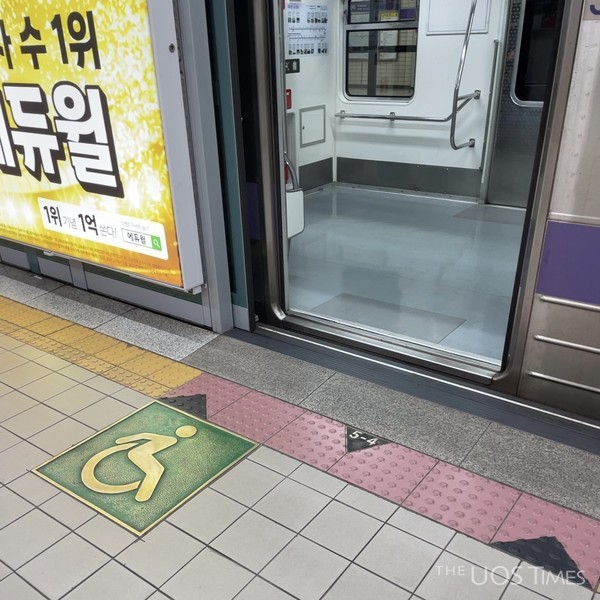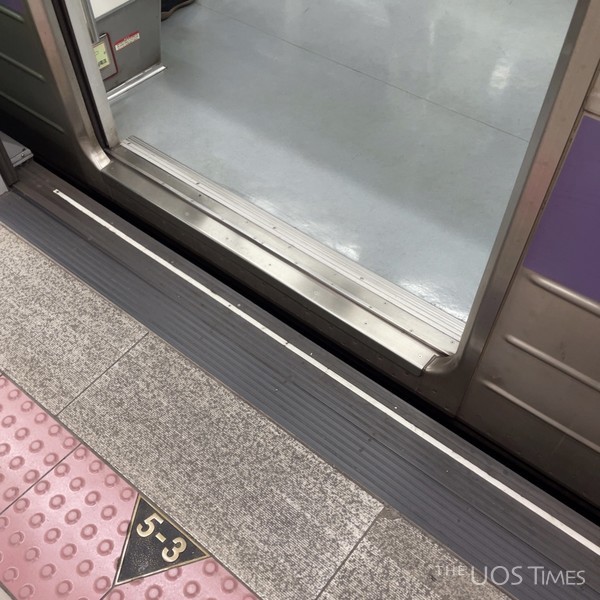

From December 2021 to February 2022, the association of the people with physical disabilities abruptly held several protests at subway stations in Seoul, South Korea. Members of the Solidarity Against Disability Discrimination (SADD) have been crying for the right of mobility of people with physical disabilities, which has been ignored by the government for more than 15 years. Due to the manner, size, and frequency of the protests, they eventually succeeded in attracting public attention.
In 2001, there was an unfortunate accident involving a disabled couple at Oido subway station. Due to the poor quality of the stairlift, both the wife and the husband fell down the stairs and succumbed to injuries. As a result, the law regarding the mobility of the physically disabled was revised in 2005. Nevertheless, according to Park Kyung-seok, the president of SADD, their legally defined rights of mobility have never been adequately guaranteed. Therefore, people with physical disabilities, including Park, could not withstand the government’s neglect anymore and ended up beginning the protests.
Why do they feel that they have been treated unfairly?
The major problems of public transportation that need to be fixed according to SADD are as follows. First, the gap between the platform and the subway is too wide. Whenever people with wheelchairs try to take the subway, the wheels are always wedged in between, which is very dangerous if the door closes and the train takes off before they fully disembark on the subway platform. There are also no elevators at 22 stations in Seoul. Not installing the elevators violates the right of people with physical disabilities to use public transportation just like people without disabilities. Moreover, as the Ministry of Land, Infrastructure and Transport (MOLIT) disclosed in 2020, only 28 percent of all the buses in Korea are low-floor buses. In other words, there are not enough opportunities for people with physical disabilities to take the bus because they are not able to step onto stairs in the first place. Moreover, SADD mentioned how citizens are ignorant about the disabled. Especially, many bus drivers still lack the responsibility to help them to use transportation; for example, they often depart even before the wheelchair has been properly fixed to the bus. The disabled feel uncomfortable and alienated by certain people who do not understand how dangerous it is.
What do they want?
Thus, SADD has requested the Ministry of Economy and Finance (MOEF) for specific budget plans. They want budget support to increase the number of special transportation services such as taxis for people with physical disabilities. The budget should also be used to make systems of public transportation better and more convenient; for instance, at least one elevator for each station is necessary. They want 100-percent low-floor buses as well so that they can avail their service, which is one of the most basic public transportations, freely like other citizens. Additionally, they have asked to reform the curriculum of education so that the overall population has a better awareness of people with physical disabilities; in particular, bus drivers should learn how to be responsible for their passengers’ safety.
How have they ended up?
After years of waiting for solutions, SADD decided to hold protests to publicize their sufferings that come from the unfairness. As a result, for three months, the traffic in Seoul during the morning rush hours was paralyzed frequently due to the surprise demonstration of solidarity. A lot of commuters had to take a taxi or a bus instead urgently because people with physical disabilities had obstructed the subway stations. People in wheelchairs inserted the wheels in the gap between the platform and the subway on purpose, stopping the trains and cracking the screen doors. In addition, they kept moving in and out of the train compartments at the platform so that it could not take off. Station employees and police officers could hardly stop or persuade the angry people in wheelchairs. Protestors also picketed at several stations and in front of the house of the minister of MOEF to notify the public. As a result, the association successfully received attention from other citizens. However, there are different perspectives on this event among people, so The UOS Times interviewed two college students to ask about their opinions on it.
Student A: “Their method was not appropriate”
Student A objects to the means that SADD had chosen for themselves as she was directly affected while commuting through the subway, which was stopped for 40 minutes due to the protests. She understands the gravity of the problem, but still, she does not believe that the protestors should have caused harm to innocent people living a busy modern life. According to her, invading others’ right to insist on their right is unjustifiable and selfish. She added, “I am still upset right now because even though I was not the one who infringed their right, I had to waste so much time. Yet, I would have supported them for sure if they had chosen other proper ways that do not infringe my right of mobility.”
Student B: “It must have been their last resort”
On the other hand, Student B supports SADD’s decision. He claimed that it was sadly the best way for them to stop the country from neglecting their demands. Moreover, he cast doubt on some people’s ideas, asking, “Where else should they be protesting then?” He said that the subway stations are the most appropriate places to defend the right of their mobility. In other words, the events would have never happened if people had listened to their voices in the first place. He added, “I am certain that not a lot of people have known about their loss until the protests. Here, in a democratic society, the handicapped do have a right to fight for their right.”
Conclusion
SADD stated that they would keep demonstrating until MOEF complied with their request, or, one of the presidential candidates gave a guarantee to make the necessary budget plans for their mobility right. Unfortunately, MOEF and MOLIT kept postponing the decision and shifting responsibilities to each other, causing the protests to continue for three months. Finally on February 23, during the televised debate, Sim Sang-jung, one of the presidential candidates, apologized and promised to help people with disabilities, so SADD announced that they would stop their protests as promised. However, they emphasized that they are still going to fight for their rights in other ways. For justice for everyone without discrimination, The UOS Times hopes the government and the related institutions to do the right things as soon as possible because “a right delayed is a right denied” as Martin Luther King Jr. once said. No more violence or inequalities that cause division in society is needed for the citizens of Korea.

